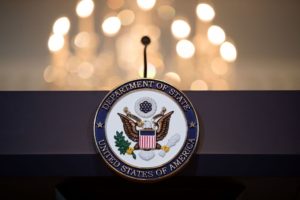Foggy Bottom has its share of detractors. Most recently, most of the barbs have come from the right-of-center crowd. Much criticism comes as President Biden’s foreign policy team struggles with self-inflicted wounds. But, unfortunately, little coming from inside the beltway would reveal the problems, gaffs, and missteps since the left-leaning fourth estate has become the vocal fifth-column apologists for the White House foreign policy and national security team’s failings. That is until now.
A fresh look at the US State Department over the years raises concerns the nation’s foreign policy experts aren’t all that expert after all. Reaching all the way back to notable policy wonks like McGeorge Bundy, President Kennedy’s national security advisor, and former Secretary of State Condoleezza Rice in President George W. Bush’s administration, Politico published “How Foreign Policy Amateurs Endanger the World,” a lengthy opinion piece by Derek Leebaert, founding editor of the Harvard/MIT quarterly International Security.
 Focusing on systemic problems in the diplomatic corps, which could be extended to the federal government generally, Leebaert states the fundamental problem is two-fold. First, the political appointment system installs naïve, inexperienced executives in foreign policy positions. Second, despite their inexperience, these appointees hold fast to “illusions of what US political-military clout could accomplish.” What’s curious is Politico, a somewhat left-of-center news source, would see fit to publish Leebaert’s take-no-prisoners excoriation of years of America’s diplomatic policy failings and failed diplomats.
Focusing on systemic problems in the diplomatic corps, which could be extended to the federal government generally, Leebaert states the fundamental problem is two-fold. First, the political appointment system installs naïve, inexperienced executives in foreign policy positions. Second, despite their inexperience, these appointees hold fast to “illusions of what US political-military clout could accomplish.” What’s curious is Politico, a somewhat left-of-center news source, would see fit to publish Leebaert’s take-no-prisoners excoriation of years of America’s diplomatic policy failings and failed diplomats.
Foreign Policy Experts Lack Experience
Singled out for criticism was the practice of choosing “spirited, clever, and well-schooled” people for sensitive foreign policy responsibilities with a paucity of necessary on-the-job experience or skills. “They are people like the current national security adviser Jake Sullivan, a lawyer who had entered government in 2009, becoming Vice President Joe Biden’s chief national security aide,” Leebaert explains. Mr. Sullivan now serves as President Biden’s national security advisor. The Afghanistan US troop withdrawal debacle was a hallmark of Sullivan’s tenure. Nonetheless, these appointments don’t come about without warning. Take, for example, the current Secretary of State, Antony Blinken. When nominated in 2014 to be the deputy secretary of state in President Obama’s administration, the late Senator John McCain (R-AZ) gave a blistering critique of the nominee:
“Mister Antony [Tony] Blinken, who is not only unqualified, but in fact, in my view, one of the worst selections that – of a very bad lot – that this president [President Obama] has chosen…This individual has actually been dangerous to America…he has been a functionary and an agent of a US foreign policy that has made the world much less safe today.”

(Photo by Drew Angerer/Getty Images)
Unfortunately, it’s too easy to paint all US foreign policy practitioners with the same critical brush. Foreign Service Officers serving in the field, having to suffer the consequences of their decisions, see the world through a more realistic lens. However, there is a more pervasive phenomenon at work within the US diplomatic community. Career executives in the State Department are more likely to exhibit calcified thinking enduring through successive administrations. “If it was good enough for Cordell Hull and FDR, it’s good enough now.” In many ways, the idea of negotiating and compromising with enemies bent on America’s demise will win the day was no more successful in 1941 than it is today. However, as it was then, there are entrenched foreign service personnel finishing their careers in hopes of garnering the Alger Hiss chair of exemplary diplomacy at some Ivy League graduate school after retirement.
What’s the Fix for Failures
As insightful in many ways as Dr. Leebaert’s views are, his opinion piece is light on solutions. The State Department’s foreign policy transgressions are manifest, but what to do about them? You can’t just turn over rocks and point to the ugly things that crawl out and say, “you need to fix those.” As heads of administrations elected to office, presidents need to have people serving on their teams who reflect their governing philosophy and policy – especially foreign policy. Excluding mindless ideologues, finding qualified executive-level experts who are superb managers and leaders to fill the 4,000 political positions is challenging on many levels. But that’s what we expect US presidents to do. There is a mantra valid in any large organization: If you spend 90% of your time on personnel, you don’t have to spend 90% of your time on personnel. Political appointees would do well to remember that.
The views expressed are those of the author and not of any other affiliation.

